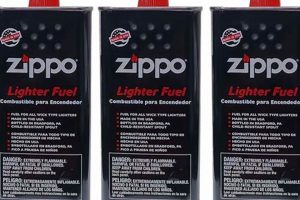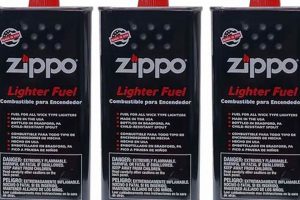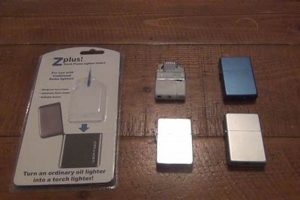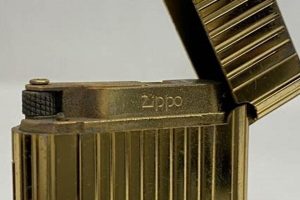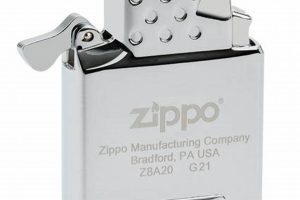Zippo lighters are designed for optimal performance with a specific type of fuel. While other flammable liquids might seem interchangeable, using the incorrect fuel can lead to malfunction, damage, and potential safety hazards. Butane and isopropyl alcohol are not recommended fuels for these lighters.
Using the correct fuel ensures the longevity and reliability of the lighter’s mechanism. The recommended fuel type is specifically formulated to burn cleanly and consistently within the lighter’s design parameters. Deviations from the recommended fuel can result in clogging, inconsistent flames, and potentially dangerous flare-ups. Historically, Zippo has emphasized the importance of using their premium lighter fluid for optimal performance and safety.
The following sections will delve into the specifics of appropriate fuel choices for Zippo lighters, exploring the reasons behind these recommendations and outlining the potential risks associated with using alternative fuels like isopropyl alcohol or butane.
Tips for Fueling a Zippo Lighter
Maintaining a Zippo lighter’s functionality and longevity depends heavily on proper fueling techniques and appropriate fuel choice. The following tips offer guidance for safe and effective lighter maintenance.
Tip 1: Utilize only recommended lighter fluid. Premium lighter fluid, specifically designed for Zippo lighters, ensures optimal performance and minimizes the risk of damage.
Tip 2: Avoid substitutes like isopropyl alcohol or butane. These fuels can damage the lighter’s internal components, leading to malfunctions and safety hazards.
Tip 3: Refuel in a well-ventilated area. This precaution minimizes the risk of inhaling fumes and ensures a safe fueling process.
Tip 4: Fill the lighter slowly and avoid overfilling. Overfilling can lead to leaks and fuel spillage, posing a fire hazard.
Tip 5: Wipe away excess fuel after refueling. This prevents accidental ignition and keeps the lighter’s exterior clean.
Tip 6: Store lighter fluid safely away from heat sources and out of reach of children. Proper storage minimizes the risk of accidents and ensures the longevity of the fluid.
Tip 7: Allow the lighter to air out briefly after refueling before igniting. This allows any spilled fluid to evaporate, reducing the risk of flare-ups.
Adhering to these guidelines ensures consistent lighter performance, prolongs the lifespan of the device, and promotes safe handling practices.
By understanding and implementing these fuel-related best practices, users can maximize the reliability and longevity of their Zippo lighters.
1. Zippo Fuel Only.
The stipulation “Zippo fuel only” directly addresses the question of fuel compatibility with Zippo lighters. This seemingly simple directive carries significant weight, impacting both the lighter’s performance and user safety. Attempting to use isopropyl alcohol or butane, despite their flammability, introduces a substantial risk of malfunction and damage. The specialized wick, packing material, and internal mechanisms of a Zippo lighter are calibrated for the specific properties of Zippo premium lighter fluid. Introducing fuels with different burning temperatures, viscosities, and chemical compositions disrupts this delicate balance. One might consider the analogy of using the wrong type of oil in a car engine while both substances lubricate, the incorrect oil can lead to significant engine damage.
Real-world consequences of using incorrect fuels in Zippo lighters range from clogged fuel lines and inconsistent flames to dangerous flare-ups and internal corrosion. Isopropyl alcohol, for example, burns hotter than Zippo fuel and can damage the lighter’s internal components. Butane, while commonly used in other lighters, requires a different type of pressurized delivery system and is incompatible with the Zippo’s design. Ignoring the “Zippo fuel only” guideline often voids the manufacturer’s warranty, leaving the user responsible for repair or replacement costs. This underscores the practical significance of adhering to the manufacturer’s recommendations. Choosing the correct fuel is not merely a suggestion but a critical factor in maintaining the lighter’s functionality and ensuring safe operation.
In conclusion, the “Zippo fuel only” directive serves as a critical safeguard against potential damage and safety hazards. While seemingly restrictive, this stipulation reflects the engineering and design considerations specific to Zippo lighters. Adhering to this guideline ensures optimal performance, longevity, and safe usage, ultimately preserving the reliability for which Zippo lighters are known.
2. No isopropyl.
The explicit prohibition against isopropyl alcohol in Zippo lighters stems from critical compatibility issues between the fuel and the lighter’s design. While both isopropyl alcohol and Zippo’s recommended lighter fluid are flammable, their chemical compositions and burning characteristics differ significantly. These differences directly impact the lighter’s functionality and longevity, even posing safety risks. Isopropyl alcohol burns at a higher temperature than Zippo fuel. This elevated temperature can damage the lighter’s internal components, including the wick, rayon balls, and flint wheel. Over time, repeated use of isopropyl alcohol can lead to warping, corrosion, and premature wear of these essential parts.
Furthermore, isopropyl alcohol’s chemical properties can react negatively with the materials used in Zippo lighter construction. The seals and gaskets designed to contain the fuel can degrade upon exposure to isopropyl alcohol, leading to leaks and fuel evaporation. Such leaks not only compromise the lighter’s functionality but also present a fire hazard. The residue left behind by burning isopropyl alcohol can also clog the fuel lines and wick, hindering fuel flow and resulting in inconsistent flames or failure to ignite. Consider a scenario where a user attempts to light a campfire in windy conditions using a Zippo filled with isopropyl alcohol. The higher burning temperature combined with potential leakage could lead to a dangerous flare-up, posing a risk of burns or igniting nearby flammable materials.
In summary, “No isopropyl” is not merely a cautionary suggestion but a vital instruction rooted in the chemical and physical realities of Zippo lighter operation. Ignoring this advice can lead to a cascade of negative consequences, from diminished performance and costly repairs to potential safety hazards. Understanding the underlying reasons for this prohibition empowers users to make informed choices, ensuring the safe and effective operation of their Zippo lighters.
3. No butane.
The “no butane” directive for Zippo lighters is crucial for maintaining functionality and safety. While butane is a common fuel for many lighters, its properties and delivery mechanism are fundamentally incompatible with Zippo’s design. This incompatibility stems from the distinct engineering principles governing each lighter type.
- Fuel Delivery Systems
Zippo lighters utilize an absorbent packing material saturated with liquid fuel, drawn up by capillary action to the wick. Butane lighters, conversely, employ a pressurized system to deliver butane gas to the ignition point. Attempting to introduce butane into a Zippo lighter’s fuel reservoir could lead to dangerous overpressure, leaks, or even rupture. Imagine attempting to fill a water balloon with air from a high-pressure compressor; the balloon, designed for a different type of filling, would likely burst. Similarly, a Zippo’s structure isn’t designed to handle pressurized butane.
- Burning Characteristics
Butane burns with a different flame characteristic than Zippo fuel. Its hotter, more concentrated flame could damage the Zippo’s wick and internal components. The design of a Zippo wick is optimized for the specific heat output and burn rate of Zippo premium lighter fluid. Introducing a fuel with different burning characteristics can lead to excessive charring, shortening the wick’s lifespan and impacting flame consistency.
- Safety Implications
Attempting to modify a Zippo lighter to accommodate butane poses serious safety risks. Modifying the lighter’s internal structure to hold pressurized fuel could compromise its integrity and lead to uncontrolled fuel release or explosions. Such modifications also void any existing warranty and negate the safety testing undergone by standard Zippo products.
- Voiding the Warranty
Using butane in a Zippo lighter immediately voids the manufacturer’s warranty. This highlights the seriousness of the “no butane” stipulation. The manufacturer explicitly states that using fuels other than Zippo premium lighter fluid can damage the lighter and create safety hazards. Therefore, any issues arising from using butane will not be covered under warranty, leaving the user responsible for repair or replacement costs.
In conclusion, the incompatibility of butane with Zippo lighters stems from fundamental design differences. The “no butane” directive isn’t arbitrary but a crucial guideline for ensuring safe and proper operation. Ignoring this advice risks damage, malfunction, and potential safety hazards, underscoring the importance of using only the recommended fuel for a Zippo lighter.
4. Risk of Damage.
The risk of damage associated with using isopropyl alcohol or butane in a Zippo lighter represents a significant concern. These fuels, though flammable, possess chemical properties and burning characteristics incompatible with the lighter’s design. This incompatibility can manifest in several ways, impacting both the lighter’s functionality and its lifespan. Using isopropyl alcohol, for example, can lead to corrosion of internal components due to its higher burning temperature and different chemical composition compared to Zippo’s recommended fuel. The seals and gaskets within the lighter can degrade, leading to fuel leaks and evaporation. Similarly, butane’s pressurized delivery mechanism poses a risk of overpressure and potential rupture of the lighter’s fuel reservoir, as it is designed for an absorbent wick system, not pressurized gas. Damage can also extend to the wick itself, as inappropriate fuels can cause excessive charring and hinder fuel flow, leading to inconsistent flames or failure to ignite.
Consider a hypothetical scenario: a user fills their Zippo with isopropyl alcohol and attempts to light it repeatedly. The higher burning temperature could gradually warp the metal casing and damage the flint wheel mechanism. Over time, the lighter might become unreliable, failing to ignite consistently or producing a weak, sputtering flame. In another scenario, attempting to introduce butane into a Zippo could lead to a dangerous buildup of pressure within the casing. If ignited, this could cause a forceful expulsion of fuel or even rupture the lighter, posing a significant fire hazard. These examples illustrate the tangible risks associated with using incorrect fuels, translating into potential repair costs or even the complete destruction of the lighter.
Understanding the specific risks associated with using inappropriate fuels in a Zippo lighter underscores the importance of adhering to the manufacturer’s recommendations. The potential for damage extends beyond mere inconvenience; it represents a safety concern and a financial investment lost. Using the correct fuel safeguards the lighter’s functionality, prolongs its lifespan, and mitigates the risk of potentially dangerous malfunctions. Choosing the right fuel is not merely a suggestion but a crucial aspect of responsible lighter ownership, ensuring both safe operation and the preservation of the lighter’s intended design and functionality.
5. Safety hazard.
The query “can I use isopropyl or butane in my Zippo?” raises significant safety concerns. Using fuels other than those specifically recommended by Zippo can lead to a range of hazards, from minor malfunctions to serious accidents. The inherent risks associated with flammable liquids underscore the importance of understanding and adhering to proper fuel usage guidelines.
- Uncontrolled Combustion
Using isopropyl alcohol, which burns at a higher temperature than Zippo fuel, increases the risk of uncontrolled combustion. This can manifest as dangerous flare-ups during ignition or even small explosions if the lighter’s casing is compromised. Imagine attempting to light a cigarette in a windy environment with a Zippo filled with isopropyl alcohol; a sudden gust of wind could create a larger, more intense flame than anticipated, potentially causing burns or igniting nearby flammable materials.
- Fuel Leakage and Spillage
Both isopropyl alcohol and butane can damage the seals and gaskets within a Zippo lighter, leading to fuel leaks. This poses not only a fire hazard but also a risk of skin irritation or chemical burns. A leaky lighter stored in a pocket could saturate clothing with flammable liquid, creating a dangerous situation if exposed to an ignition source. Even a small spark could ignite the leaked fuel, leading to significant burns.
- Overpressure and Rupture
Attempting to use butane in a Zippo, which is designed for liquid fuel and not pressurized gas, can cause a dangerous buildup of pressure within the lighter’s casing. This can lead to rupture or forceful expulsion of fuel upon ignition, creating a substantial risk of burns and fire. Consider a scenario where a user mistakenly fills their Zippo with butane and attempts to light it; the resulting pressure release could propel burning fuel and lighter parts outwards, posing a significant hazard to the user and anyone nearby.
- Invalidation of Safety Features
Zippo lighters are engineered with specific safety features predicated on the use of their designated fuel. Using alternative fuels compromises these safety mechanisms, increasing the risk of accidents. For instance, the chimney surrounding the flame is designed to manage the specific burn characteristics of Zippo fuel. Using a different fuel with a higher burn temperature or different flame pattern can make the lighter more susceptible to overheating and malfunction, potentially bypassing the intended safety features.
In summary, the seemingly simple act of choosing the correct fuel for a Zippo lighter carries significant safety implications. Disregarding the manufacturer’s recommendations by using isopropyl alcohol or butane introduces a range of hazards, increasing the risk of accidents and potentially serious injuries. Understanding these risks underscores the critical importance of using only Zippo premium lighter fluid to ensure safe and proper operation.
6. Void Warranty.
The relationship between using unapproved fuels like isopropyl alcohol or butane and voiding a Zippo lighter’s warranty is direct and consequential. Zippo’s warranty explicitly covers defects in materials and workmanship under normal use. However, using fuels other than Zippo premium lighter fluid is explicitly excluded from the warranty’s terms. This exclusion stems from the potential for damage caused by these fuels. Isopropyl alcohol, with its higher burning temperature and different chemical properties, can corrode internal components and damage seals. Butane, requiring a pressurized delivery system, is incompatible with the Zippo’s design and can cause dangerous pressure buildup or leaks. Such damage, resulting directly from the use of improper fuel, is not covered under warranty.
Consider a situation where a consumer fills their Zippo with butane, leading to a malfunction. Upon contacting Zippo for repair or replacement under warranty, the consumer would likely be informed that the warranty is void due to the use of an unapproved fuel. This leaves the consumer responsible for the full cost of repair or replacement. Another example involves a lighter damaged by the corrosive effects of isopropyl alcohol. While the damage might seem like a manufacturing defect, the use of the incorrect fuel negates the warranty’s protection. These examples illustrate the practical implications of using inappropriate fuels, shifting the financial burden of repair or replacement from the manufacturer to the consumer.
The “void warranty” stipulation underscores the importance of using only Zippo premium lighter fluid. This policy protects the manufacturer from liability for damage caused by misuse while incentivizing consumers to adhere to proper fuel usage guidelines. Understanding this connection reinforces the significance of following manufacturer recommendations, not just for optimal performance but also to maintain warranty coverage and avoid unexpected expenses. Ultimately, using the correct fuel safeguards both the lighter’s functionality and the consumer’s investment.
Frequently Asked Questions
This section addresses common inquiries regarding fuel compatibility with Zippo lighters, clarifying potential misconceptions and emphasizing safe handling practices.
Question 1: What happens if isopropyl alcohol is used in a Zippo lighter?
Using isopropyl alcohol can damage internal components due to its higher burning temperature and corrosive properties. This can lead to malfunctions, leaks, and potentially dangerous flare-ups.
Question 2: Can butane be used as a fuel substitute in a Zippo lighter?
No. Butane requires a pressurized delivery system incompatible with Zippo lighters. Attempting to use butane can lead to dangerous overpressure, leaks, or even rupture of the lighter casing.
Question 3: Does using the wrong fuel void the Zippo warranty?
Yes, using any fuel other than Zippo premium lighter fluid voids the manufacturer’s warranty. Damage resulting from improper fuel usage is not covered.
Question 4: Why is Zippo premium lighter fluid recommended?
Zippo premium lighter fluid is specifically formulated for optimal performance and safe operation within Zippo lighters. Its burn rate, viscosity, and chemical composition are tailored to the lighter’s design.
Question 5: Are there any safety concerns associated with using the wrong fuel?
Yes. Using improper fuels can lead to uncontrolled combustion, fuel leaks, overpressure, and the invalidation of built-in safety features, increasing the risk of accidents and injuries.
Question 6: What should be done if the wrong fuel is accidentally used?
If the wrong fuel is accidentally used, purge the lighter immediately. Flush the reservoir with the correct Zippo premium lighter fluid and replace the wick and flint. If any damage is suspected, contact Zippo for repair or replacement advice.
Strict adherence to the manufacturer’s recommendations regarding fuel usage is paramount for maintaining the functionality, longevity, and safe operation of Zippo lighters. Prioritizing safety and proper maintenance ensures a positive user experience.
For further information or specific inquiries, consulting the manufacturer’s official resources or contacting customer support directly is recommended.
Conclusion
Examination of the query “can I use isopropyl or butane in my Zippo?” reveals the critical importance of fuel selection for lighter functionality and user safety. Using isopropyl alcohol or butane poses significant risks, including damage to internal components, fire hazards, and invalidation of the manufacturer’s warranty. These risks stem from the fuels’ incompatibility with the lighter’s design, engineered specifically for Zippo premium lighter fluid. The lighter’s performance, longevity, and safety mechanisms rely on the use of the correct fuel. Ignoring these guidelines compromises the intended functionality and increases the likelihood of malfunctions, potentially leading to accidents.
Maintaining a Zippo lighter’s optimal performance and ensuring safe operation necessitate strict adherence to the manufacturer’s recommendations. Choosing the correct fuel is not merely a suggestion but a fundamental requirement for responsible lighter ownership. Prioritizing safety and adhering to established guidelines preserves the lighter’s integrity, mitigates potential hazards, and ensures a positive user experience. Continued reliance on manufacturer-approved resources guarantees access to accurate information and fosters a culture of safety and informed product usage.


